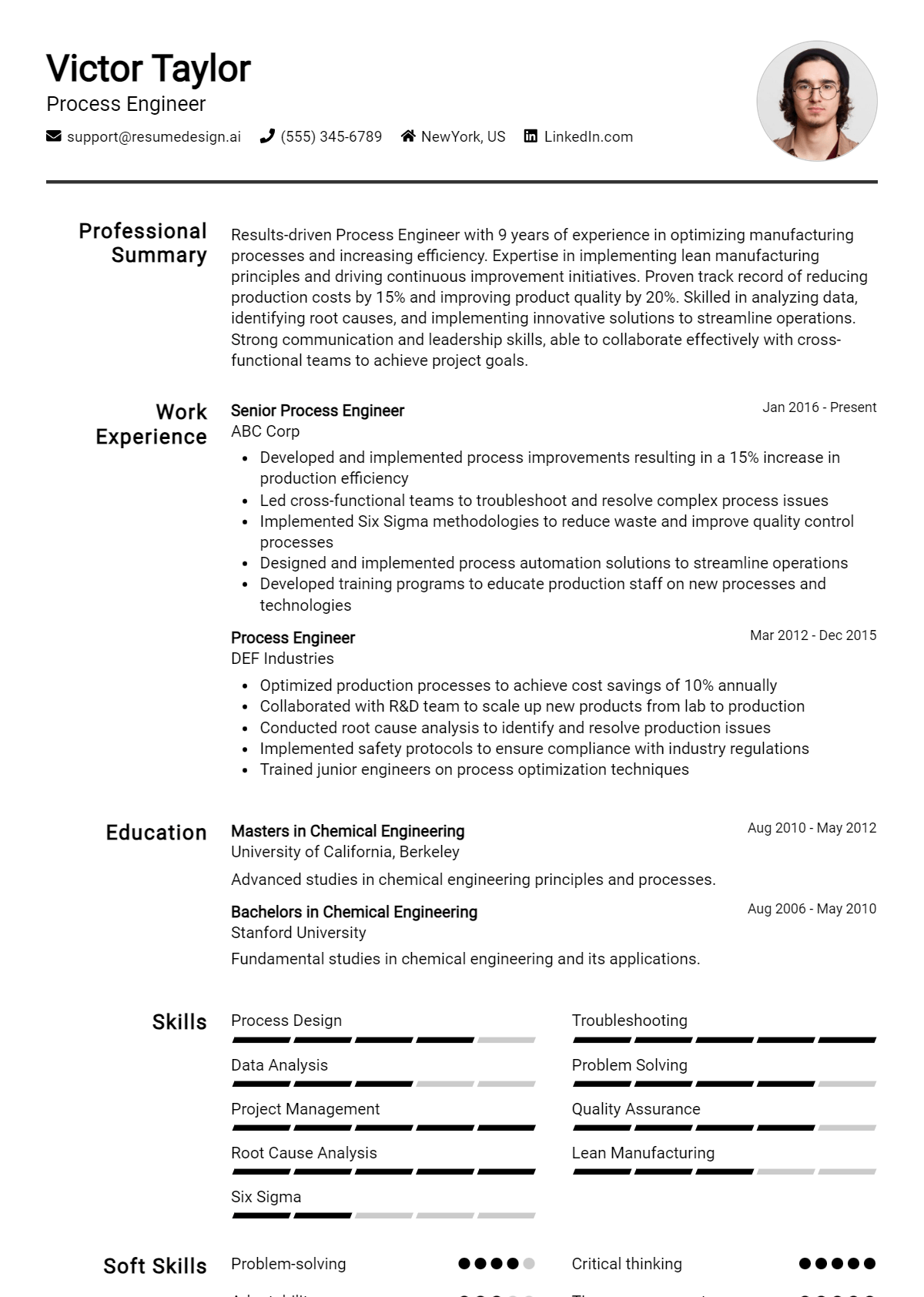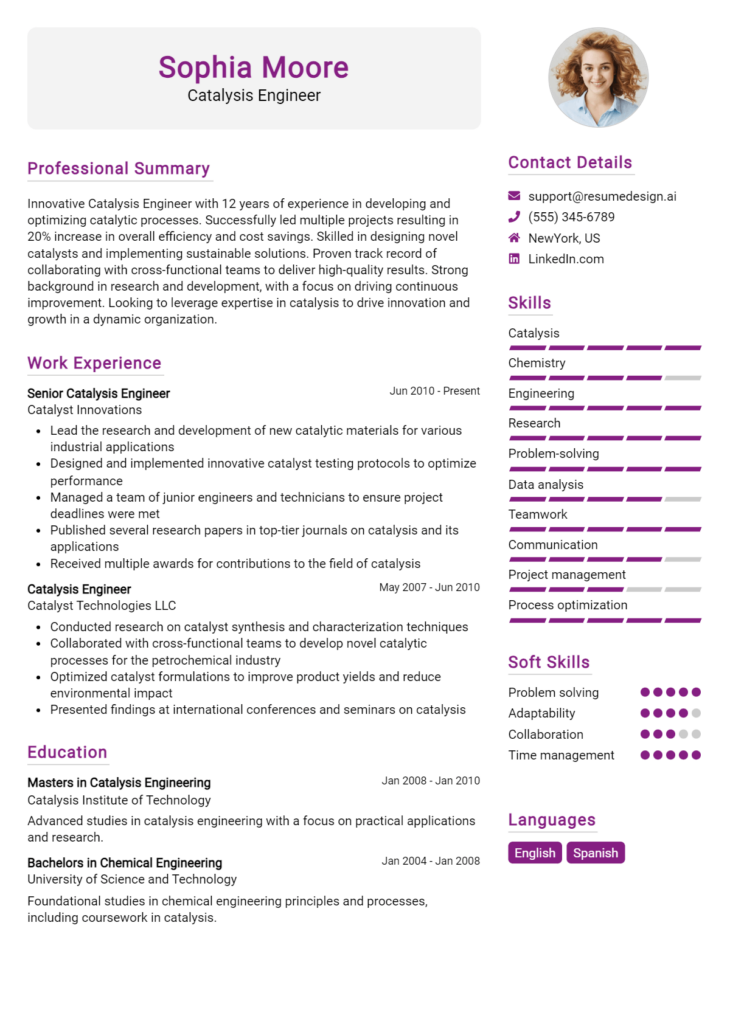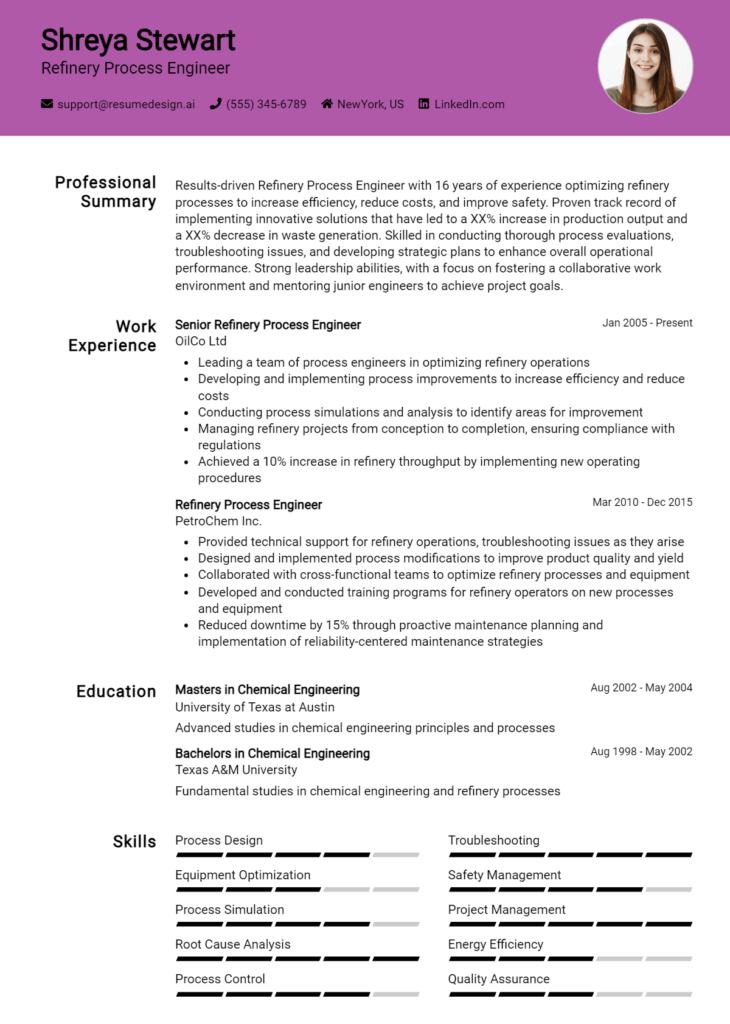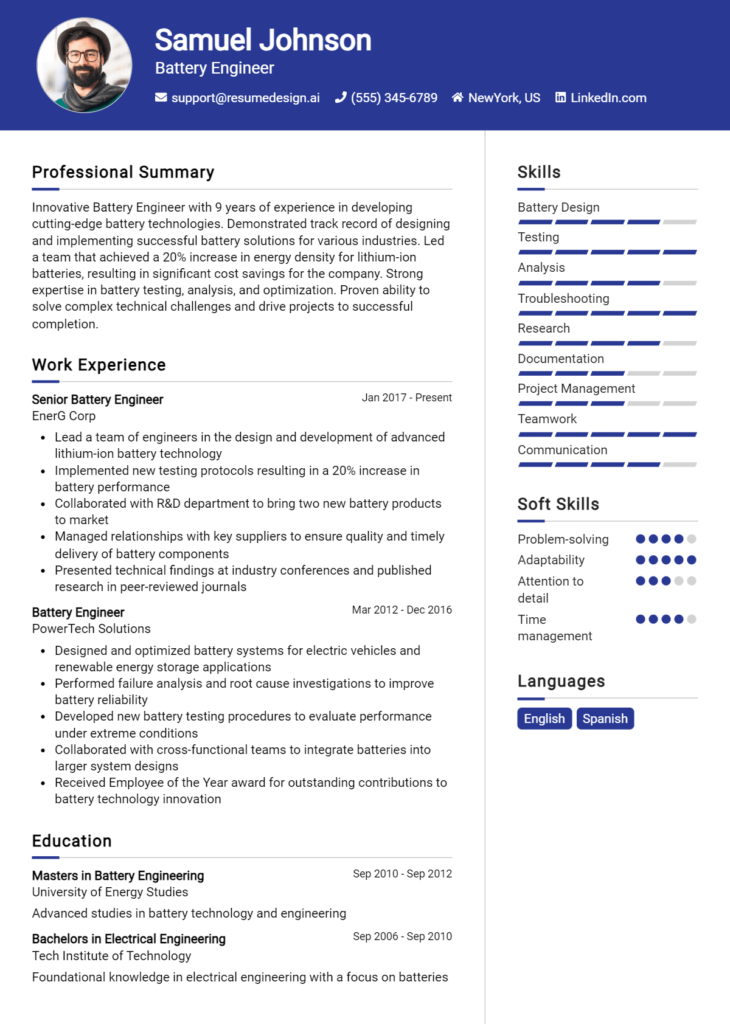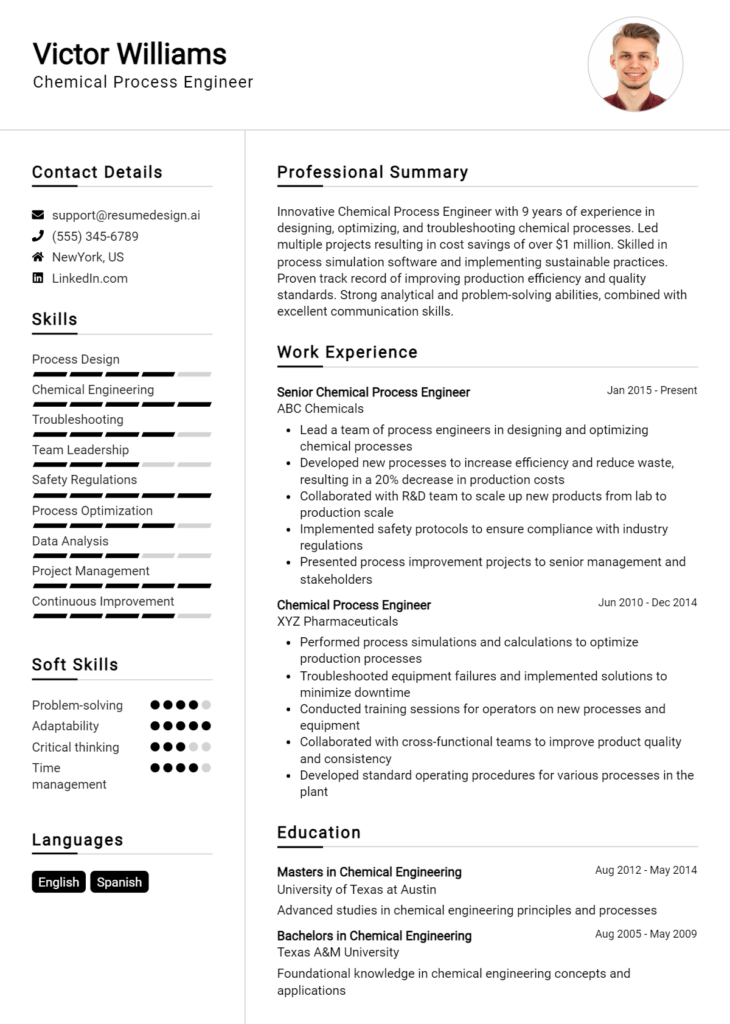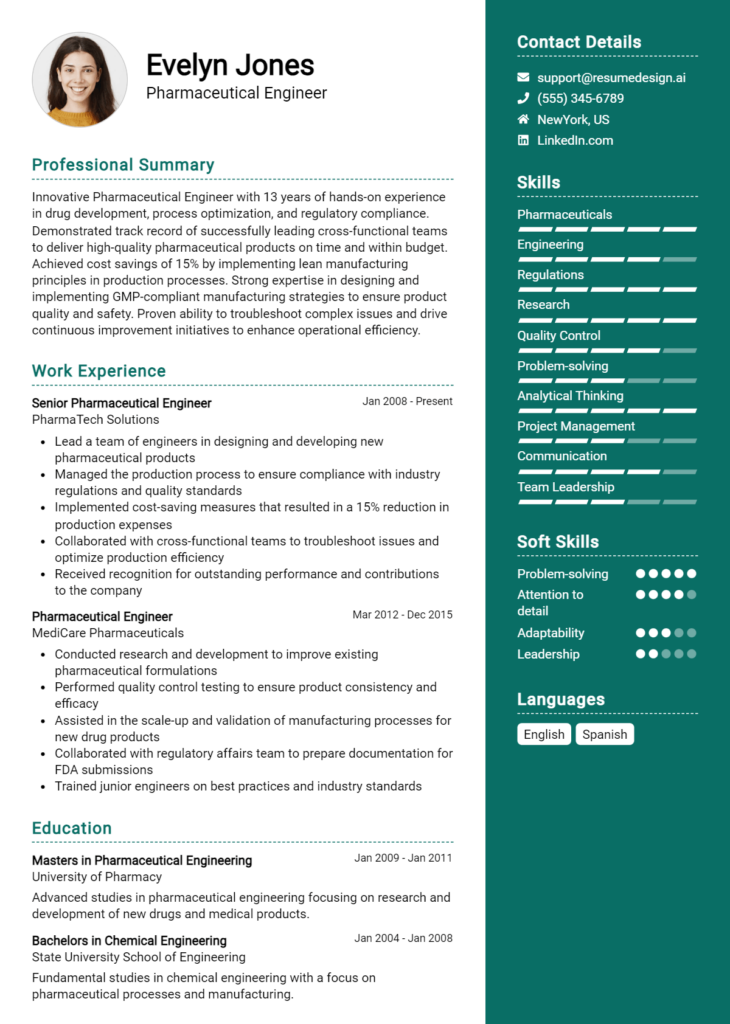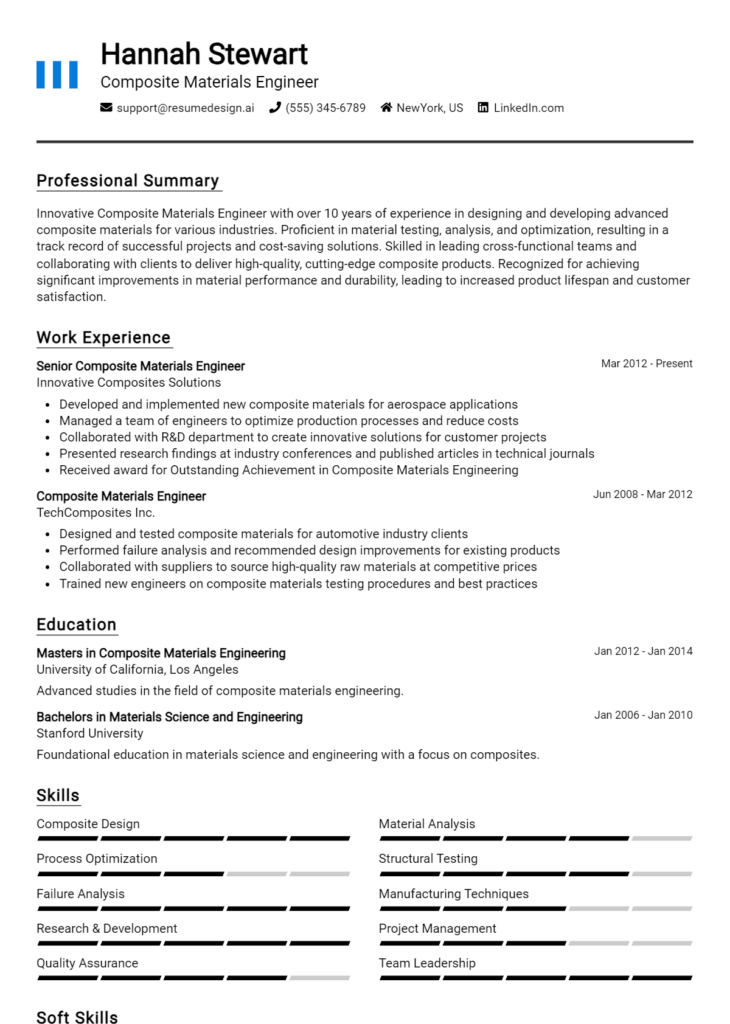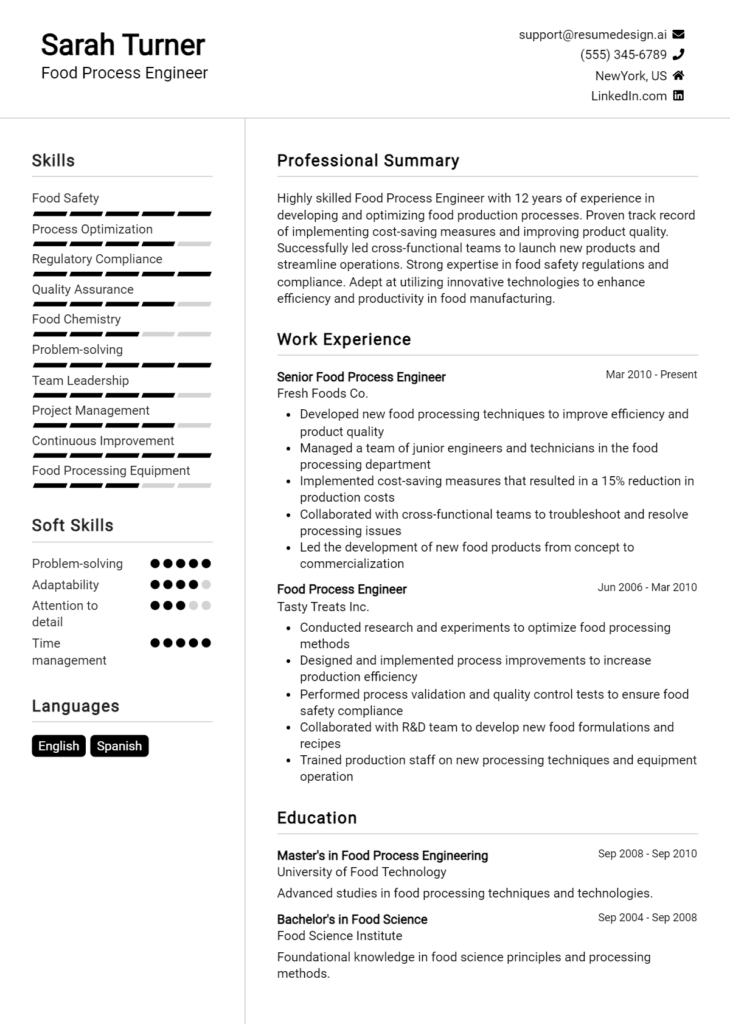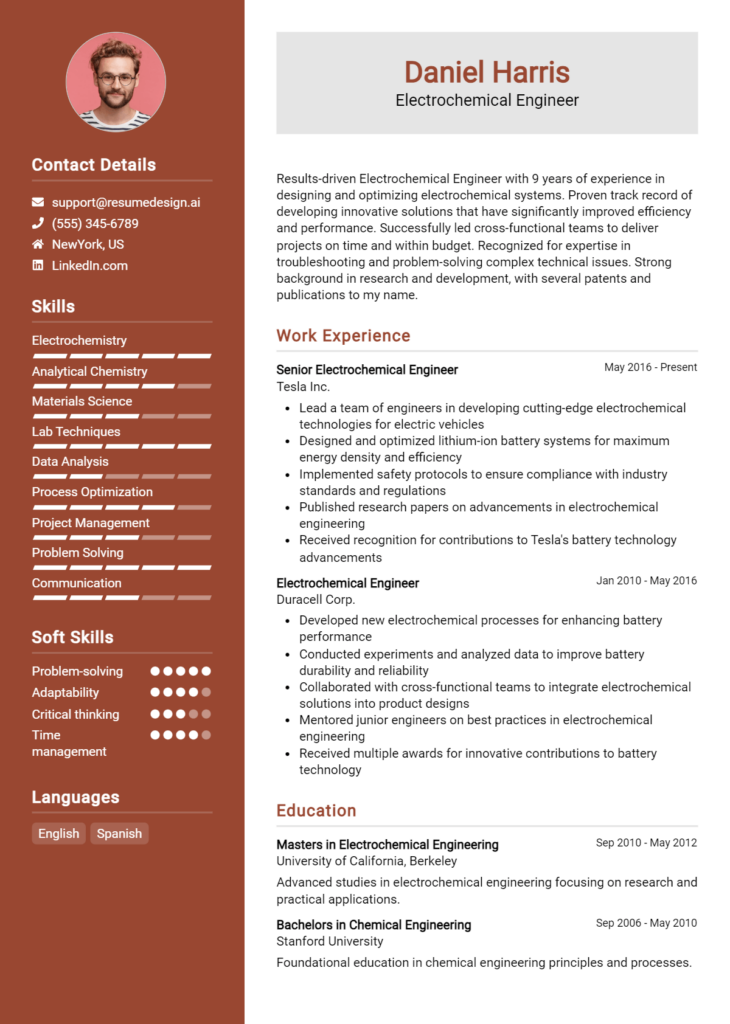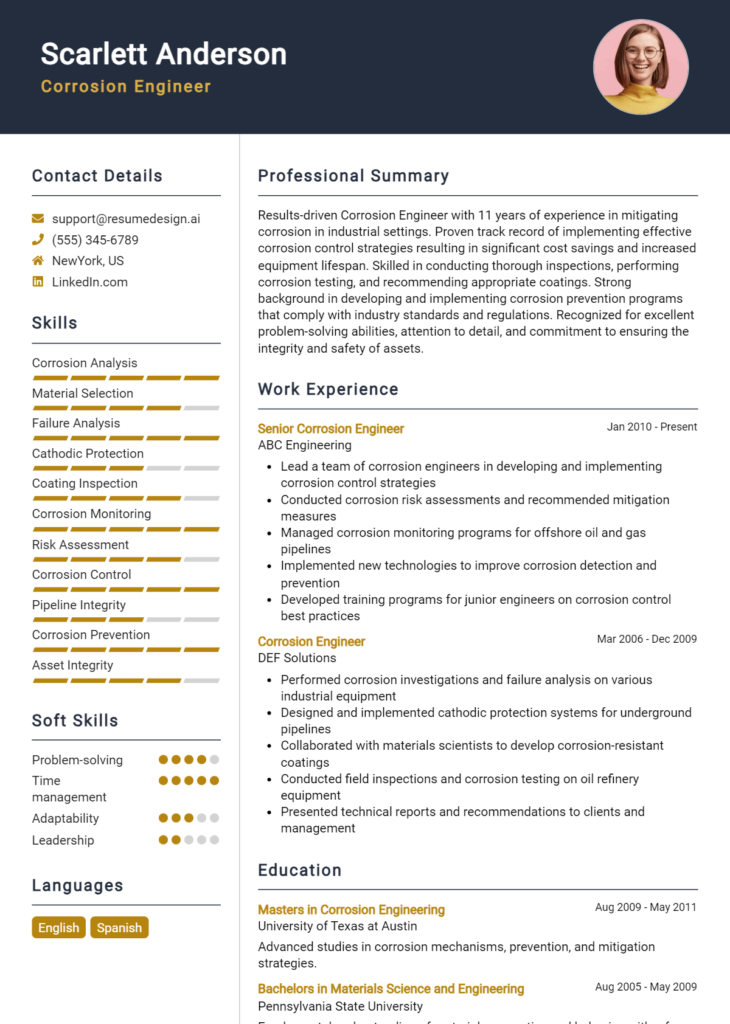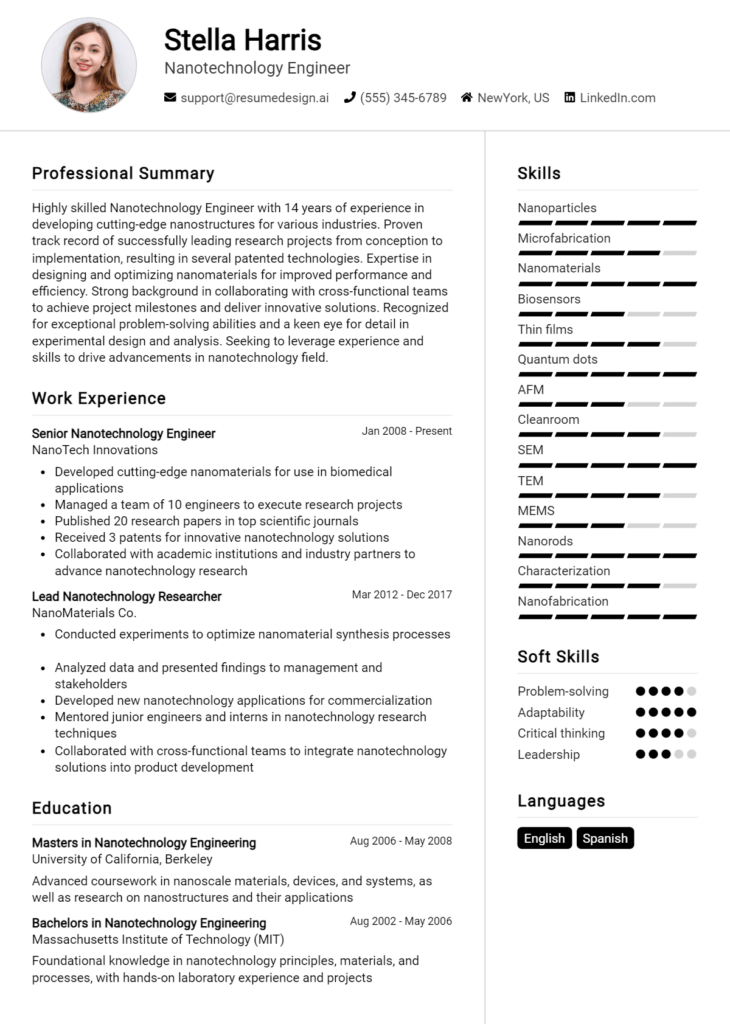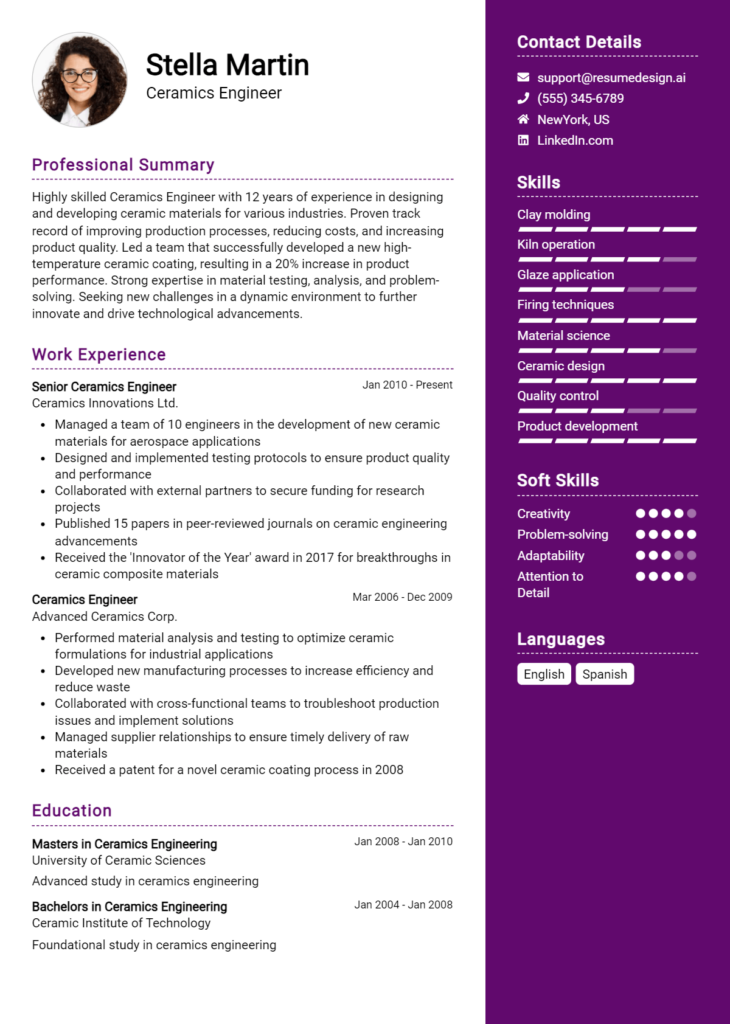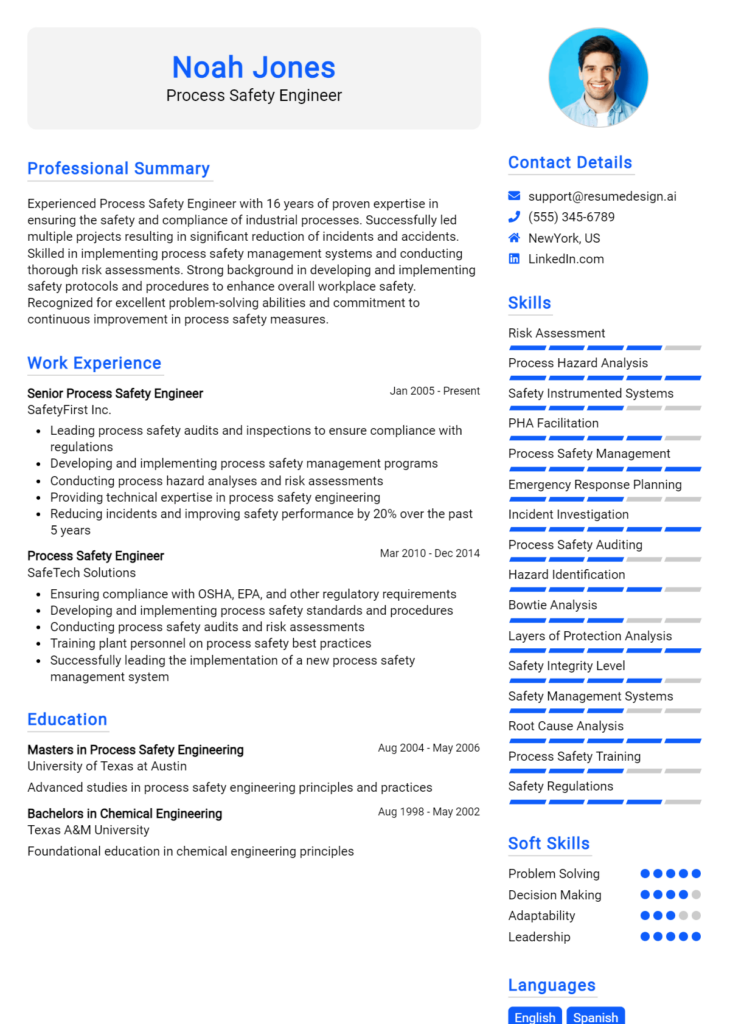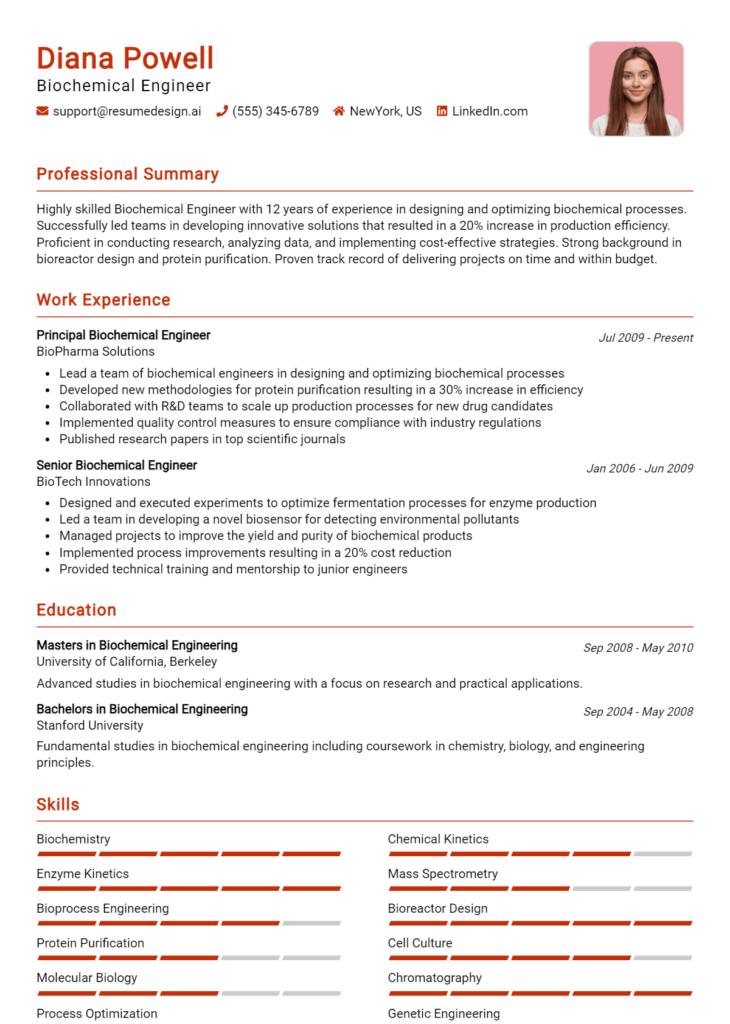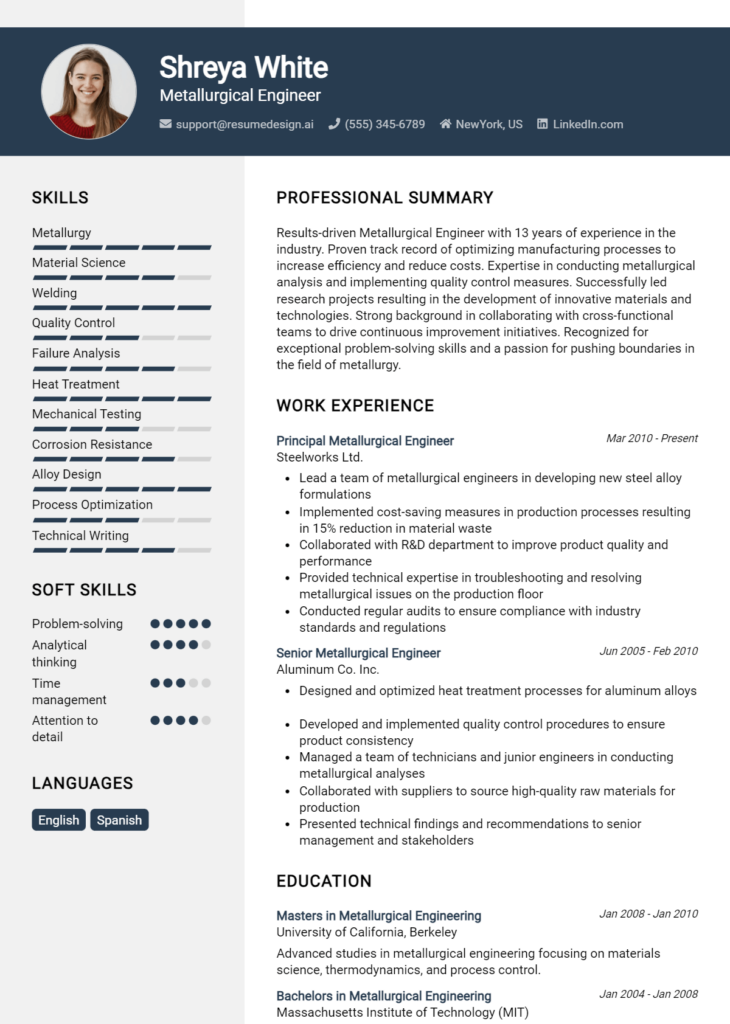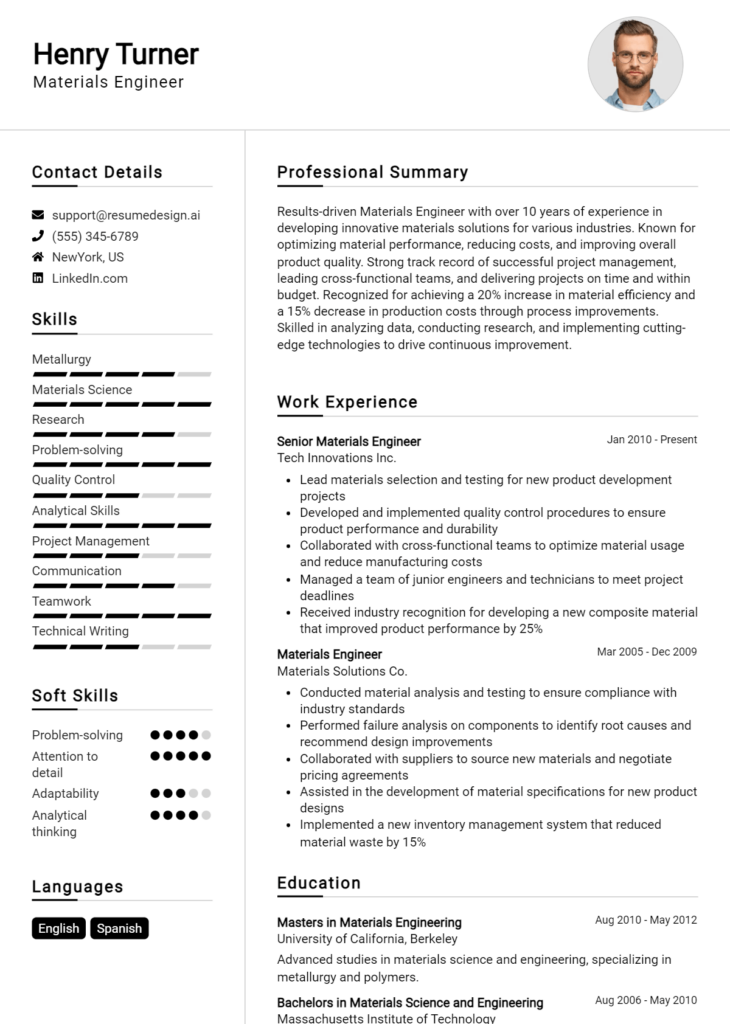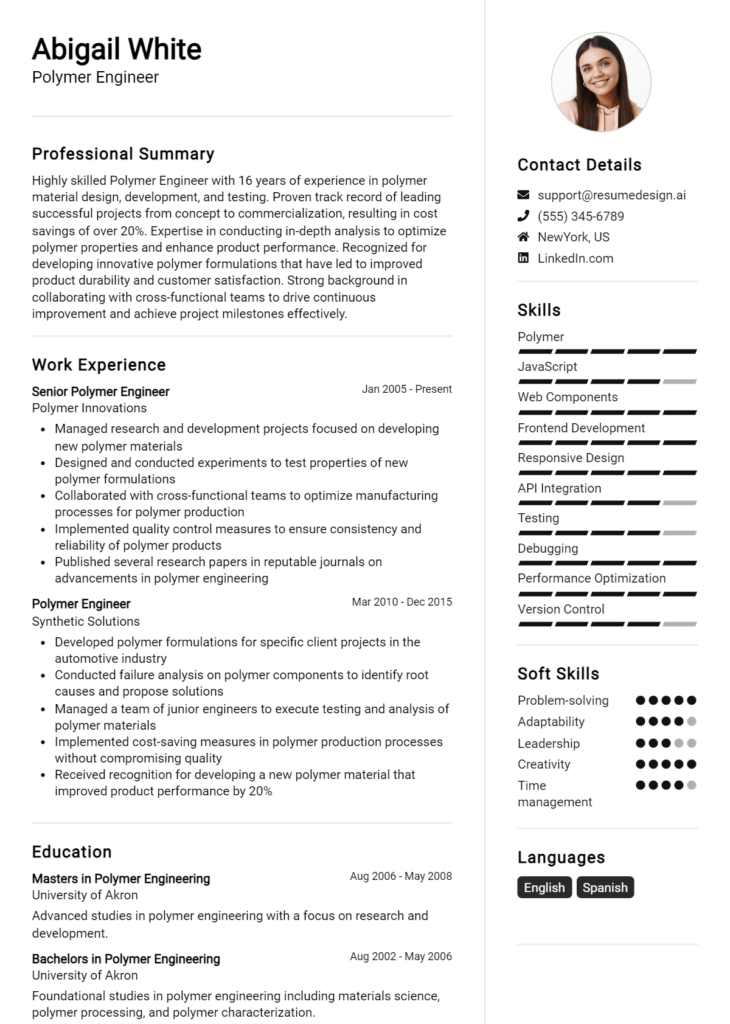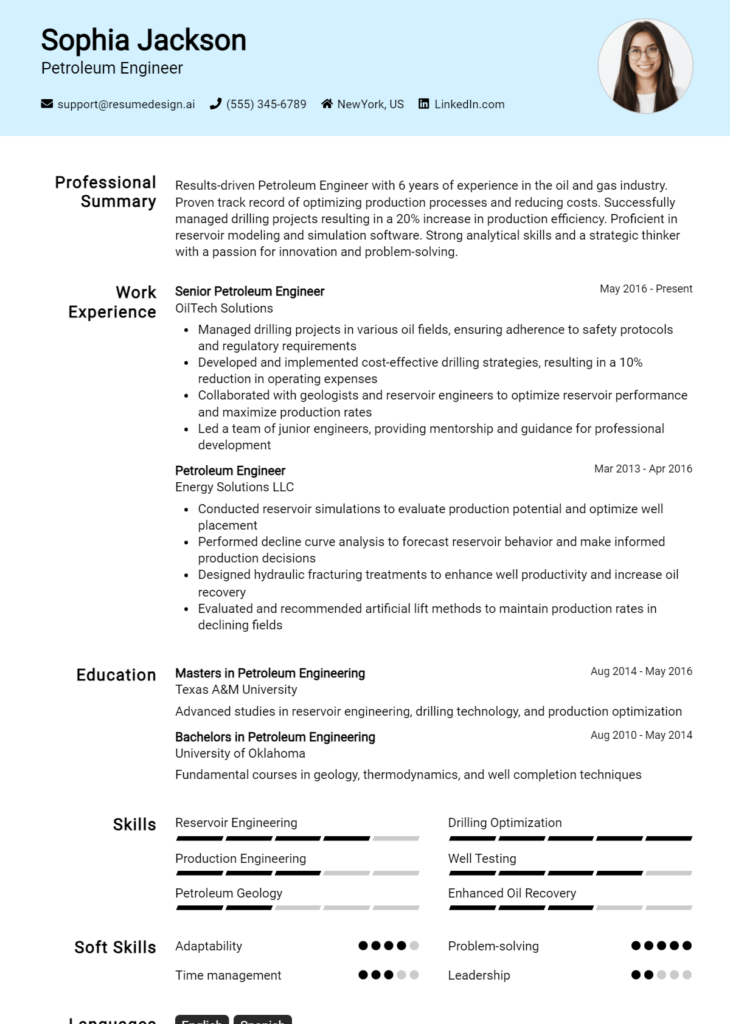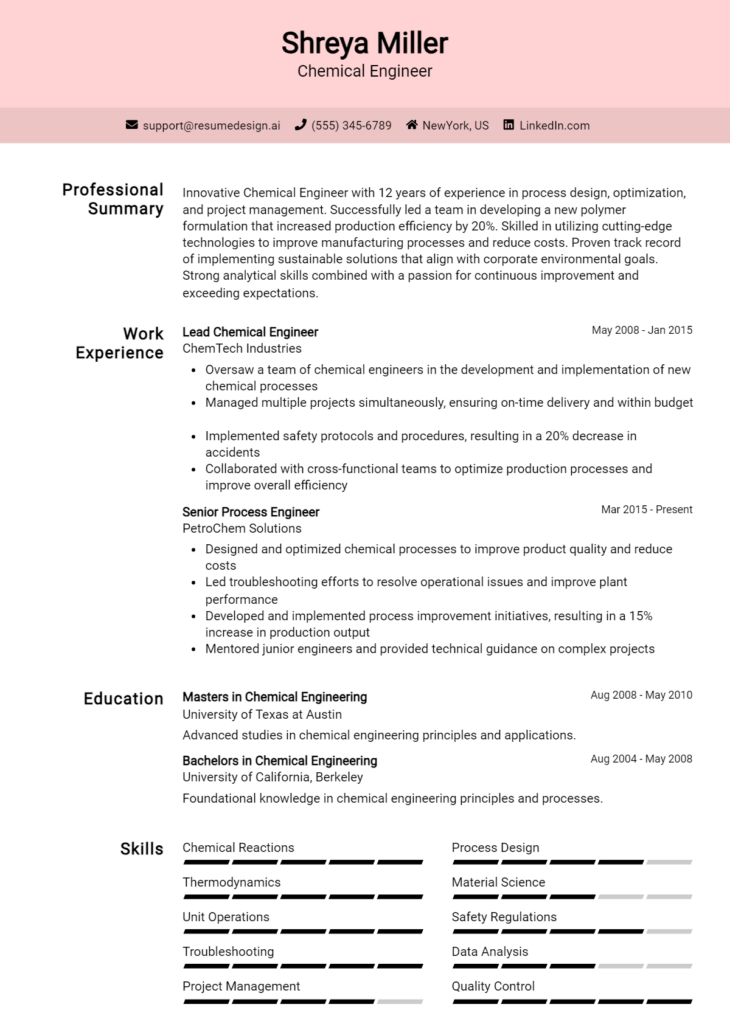Process Engineer Core Responsibilities
A Process Engineer plays a crucial role in optimizing manufacturing processes, requiring a blend of technical, operational, and problem-solving skills. They collaborate across departments, including production, quality assurance, and research and development, to enhance efficiency and productivity. Successful Process Engineers must analyze data, troubleshoot issues, and implement innovative solutions that align with organizational goals. A well-structured resume highlighting these competencies can effectively showcase a candidate's qualifications, making them an asset to any team.
Common Responsibilities Listed on Process Engineer Resume
- Designing and optimizing manufacturing processes to improve efficiency.
- Conducting process simulations and data analysis to identify improvements.
- Collaborating with cross-functional teams to ensure process alignment.
- Implementing quality control measures to meet industry standards.
- Developing and maintaining process documentation and procedures.
- Conducting root cause analysis to resolve production issues.
- Training staff on new processes and safety protocols.
- Monitoring and analyzing process performance metrics.
- Researching and implementing new technologies and methodologies.
- Assisting in cost-reduction initiatives and resource management.
- Participating in continuous improvement projects and initiatives.
High-Level Resume Tips for Process Engineer Professionals
In the competitive field of Process Engineering, a well-crafted resume is essential for making a lasting first impression on potential employers. Your resume serves as a gateway to your professional identity, showcasing not only your technical skills but also your achievements and contributions to past projects. A strong resume can open doors to exciting opportunities and set you apart from other candidates. This guide will provide practical and actionable resume tips specifically tailored for Process Engineer professionals, ensuring your application highlights your strengths and aligns with the expectations of hiring managers.
Top Resume Tips for Process Engineer Professionals
- Tailor your resume to each job application by closely aligning your skills and experiences with the specific job description.
- Highlight relevant experience in process design, optimization, and project management to demonstrate your expertise in the field.
- Use quantifiable achievements to illustrate your impact, such as percentage improvements in efficiency or cost savings realized in previous roles.
- Include industry-specific skills, such as knowledge of Lean Six Sigma, CAD software, and process simulation tools, to showcase your technical aptitude.
- Utilize action verbs to convey your responsibilities and accomplishments dynamically—words like "designed," "implemented," and "optimized" can make a strong impression.
- Incorporate keywords from the job posting to ensure your resume passes through Applicant Tracking Systems (ATS) that many companies use.
- Keep your resume concise and focused; aim for one page, or two at most, to maintain the hiring manager's attention.
- Format your resume for readability by using clear headings, bullet points, and consistent fonts and sizes.
- Showcase your continuous learning and professional development by mentioning relevant certifications, workshops, or training programs.
- Include a summary statement that succinctly outlines your career goals, key skills, and what you bring to the role of a Process Engineer.
By implementing these tips, you can significantly enhance your chances of landing a job in the Process Engineer field. A polished and targeted resume not only showcases your qualifications but also demonstrates your commitment to professional excellence, making you a compelling candidate for potential employers.
Why Resume Headlines & Titles are Important for Process Engineer
In the competitive field of process engineering, having a well-crafted resume is essential for standing out among numerous applicants. Resume headlines and titles serve as a powerful first impression, allowing candidates to immediately capture the attention of hiring managers. A strong headline succinctly summarizes a candidate's key qualifications and relevant experience, serving as an impactful phrase that sets the tone for the entire resume. It should be concise, relevant, and directly aligned with the job being applied for, ensuring that hiring managers quickly grasp the candidate's suitability for the role.
Best Practices for Crafting Resume Headlines for Process Engineer
- Keep it concise: Aim for a headline that is no longer than a sentence.
- Be role-specific: Tailor your headline to reflect the specific position you are applying for.
- Highlight key skills: Include your most relevant skills that align with the job description.
- Use action-oriented language: Utilize strong verbs to convey your impact and expertise.
- Showcase accomplishments: Mention significant achievements that demonstrate your effectiveness in previous roles.
- Avoid jargon: Use clear and straightforward language to ensure broad understanding.
- Incorporate keywords: Integrate industry-specific terms to optimize for Applicant Tracking Systems (ATS).
- Make it engaging: Use persuasive language that draws the hiring manager's attention.
Example Resume Headlines for Process Engineer
Strong Resume Headlines
Dynamic Process Engineer with 5+ Years of Experience in Lean Manufacturing and Process Optimization
Results-Driven Process Engineer Specializing in Continuous Improvement and Cost Reduction Strategies
Detail-Oriented Process Engineer with Proven Track Record in Project Management and Quality Control
Weak Resume Headlines
Engineer Looking for a Job
Process Engineer with Some Experience
Hardworking Individual Seeking Opportunities
Strong headlines are effective because they are tailored, specific, and highlight relevant skills or achievements, making it easy for hiring managers to see the candidate's value at a glance. In contrast, weak headlines fail to impress due to their vagueness and lack of focus, leaving hiring managers uncertain about the candidate's qualifications and suitability for the role. A compelling headline can make a significant difference in capturing attention and securing an interview.
Writing an Exceptional Process Engineer Resume Summary
Writing an exceptional resume summary is crucial for a Process Engineer as it serves as the first impression for hiring managers. A strong summary quickly captures attention by effectively showcasing key skills, relevant experience, and notable accomplishments that align with the specific job role. It should be concise and impactful, providing a snapshot of the candidate's qualifications that encourages the reader to delve deeper into the resume. Crafting a tailored summary not only highlights the candidate’s fit for the position but also sets the tone for the rest of the document.
Best Practices for Writing a Process Engineer Resume Summary
- Quantify Achievements: Use numbers and metrics to demonstrate impact, such as cost savings, efficiency improvements, or project durations.
- Focus on Relevant Skills: Highlight specific technical skills and software proficiencies that are pertinent to the role you are applying for.
- Tailor for the Job Description: Customize your summary for each application by incorporating keywords and phrases from the job listing.
- Keep it Concise: Aim for 3-5 sentences that succinctly summarize your qualifications without overwhelming the reader.
- Highlight Problem-Solving Abilities: Emphasize your capacity to identify issues and implement effective solutions in process engineering.
- Showcase Industry Knowledge: Mention any relevant industry standards, regulations, or methodologies you are experienced with.
- Include Soft Skills: Don’t forget to include transferable skills such as teamwork, communication, and leadership that enhance your engineering capabilities.
- Use Action Verbs: Start sentences with strong action verbs to convey a sense of proactivity and effectiveness.
Example Process Engineer Resume Summaries
Strong Resume Summaries
Results-driven Process Engineer with over 7 years of experience in optimizing manufacturing processes, achieving a 20% reduction in production costs through innovative lean techniques. Proficient in Six Sigma methodologies and CAD software, with a proven track record of successful project management.
Detail-oriented Process Engineer with expertise in chemical processes and a history of increasing efficiency by 30%. Skilled in using process simulation software and leading cross-functional teams to implement improvements, resulting in a 15% increase in product yield.
Experienced Process Engineer specializing in food manufacturing, successfully implementing quality control measures that reduced waste by 25% and improved compliance with industry regulations. Strong analytical skills with a focus on data-driven decision-making.
Weak Resume Summaries
Process Engineer with some experience in manufacturing. Looking for a new opportunity to apply my skills.
Motivated engineer seeking to find a position in process engineering. Knowledgeable about various engineering concepts.
The examples above illustrate the distinction between strong and weak resume summaries. Strong summaries effectively quantify achievements and directly relate to the job role, showcasing specific skills and experiences that appeal to hiring managers. In contrast, weak summaries lack detail, are vague, and fail to demonstrate the candidate's unique qualifications or contributions, making them less compelling in a competitive job market.
Education and Certifications Section for Process Engineer Resume
The Education and Certifications section of a Process Engineer resume is crucial as it showcases the candidate's academic background, relevant industry certifications, and commitment to continuous learning. This section serves to establish credibility and demonstrate that the candidate possesses the necessary foundational knowledge and specialized skills required for the role. By providing detailed information about relevant coursework, certifications, and specialized training, candidates can significantly enhance their appeal to potential employers, aligning their qualifications with the specific demands of the job.
Best Practices for Process Engineer Education and Certifications
- Focus on relevant degrees in engineering or related fields, such as Chemical Engineering, Mechanical Engineering, or Industrial Engineering.
- Include industry-recognized certifications, such as Six Sigma Green Belt, Lean Manufacturing, or Project Management Professional (PMP).
- Highlight specialized training related to process improvement, quality control, or safety standards.
- Provide concise descriptions of relevant coursework that demonstrates specific skills or knowledge applicable to the job.
- List any continuing education courses or workshops that reflect a commitment to staying updated in the field.
- Use clear formatting to differentiate between degrees, certifications, and training for easy readability.
- Prioritize recent qualifications over outdated ones to reflect current industry standards.
- Tailor the education and certification details to match the requirements of the specific job listing.
Example Education and Certifications for Process Engineer
Strong Examples
- Bachelor of Science in Chemical Engineering, University of XYZ
- Six Sigma Green Belt Certification, American Society for Quality (ASQ)
- Certificate in Process Safety Management, National Fire Protection Association (NFPA)
- Relevant Coursework: Process Dynamics and Control, Thermodynamics, and Chemical Reaction Engineering
Weak Examples
- Associate Degree in General Studies, Community College of ABC
- Basic Computer Skills Certification (Outdated)
- High School Diploma from XYZ High School
- Certification in Microsoft Office Suite (Not industry-specific)
The strong examples are considered effective as they directly align with the qualifications and skills necessary for a Process Engineer role, showcasing relevant degrees and certifications that reflect industry standards. In contrast, the weak examples are deemed ineffective because they include irrelevant or outdated qualifications that do not contribute to the candidate’s suitability for a Process Engineer position, potentially diminishing their credibility in a competitive job market.
Top Skills & Keywords for Process Engineer Resume
A well-crafted resume is crucial for a Process Engineer, as it serves as the first impression to potential employers. Highlighting the right skills can set you apart from other candidates and demonstrate your ability to optimize processes, enhance efficiency, and contribute to the overall success of a project. Both hard and soft skills play a significant role in showcasing your expertise and adaptability in this dynamic field. Understanding which skills to emphasize will not only improve your employability but also align your qualifications with the specific demands of the industry. For more information on how to effectively present your skills, check out our guide on skills.
Top Hard & Soft Skills for Process Engineer
Soft Skills
- Problem-solving
- Critical thinking
- Communication
- Team collaboration
- Adaptability
- Attention to detail
- Time management
- Leadership
- Creativity
- Conflict resolution
- Decision-making
- Interpersonal skills
Hard Skills
- Process mapping
- Statistical analysis
- Lean manufacturing
- Six Sigma methodologies
- Quality control techniques
- Project management software (e.g., Microsoft Project)
- CAD software (e.g., AutoCAD, SolidWorks)
- Data analysis tools (e.g., MATLAB, Minitab)
- Regulatory compliance knowledge
- Material science understanding
- Process simulation software
- Risk assessment techniques
- Documentation and reporting
- Equipment calibration and validation
By focusing on these essential skills in your resume, you can effectively showcase your qualifications and experience to potential employers, making you a strong candidate for any Process Engineer position. Additionally, don't forget to highlight your relevant work experience to further bolster your application.
Stand Out with a Winning Process Engineer Cover Letter
I am writing to express my enthusiasm for the Process Engineer position at [Company Name], as advertised on [where you found the job listing]. With a Bachelor’s degree in Chemical Engineering and over five years of experience in process optimization and project management, I am confident in my ability to contribute effectively to your team. My background in implementing innovative solutions to streamline operations and enhance productivity aligns well with your commitment to excellence and sustainability.
In my previous role at [Previous Company Name], I successfully led a cross-functional team in redesigning the manufacturing process for our flagship product. This initiative resulted in a 20% reduction in production costs and a significant improvement in product quality. I am skilled in utilizing various process simulation software and statistical analysis tools, which allow me to identify inefficiencies and develop actionable strategies. My experience in conducting rigorous process evaluations and collaborating with stakeholders ensures that I can effectively drive continuous improvement initiatives while adhering to safety and regulatory standards.
I am particularly impressed by [Company Name]'s dedication to innovation and sustainability in engineering practices. I share this vision and am excited about the opportunity to contribute to projects that prioritize environmental responsibility while maintaining operational efficiency. I am adept at leveraging data-driven insights to make informed decisions and foster a culture of continuous improvement among team members. My strong communication skills and ability to work collaboratively with diverse teams have been key to my success in previous roles, and I am eager to bring this collaborative spirit to [Company Name].
Thank you for considering my application. I am looking forward to the opportunity to discuss how my skills and experiences align with the goals of your team. I am excited about the possibility of contributing to [Company Name] and am eager to bring my passion for process engineering to your organization. Please feel free to contact me at [your phone number] or [your email address] to schedule a conversation.
Common Mistakes to Avoid in a Process Engineer Resume
When applying for a position as a Process Engineer, crafting a compelling resume is crucial to showcase your skills and experiences effectively. However, many candidates make common mistakes that can hinder their chances of landing an interview. Understanding these pitfalls can help you create a stronger resume that stands out to hiring managers. Here are some frequent errors to avoid when writing your Process Engineer resume:
Generic Objective Statements: Using a one-size-fits-all objective can make your resume seem impersonal. Tailor your objective to reflect your specific career goals and how they align with the company’s mission.
Lack of Quantifiable Achievements: Failing to include measurable outcomes in your past roles can diminish the impact of your achievements. Use numbers and statistics to highlight improvements you've made, such as increased efficiency percentages or cost savings.
Overloading with Technical Jargon: While technical skills are vital, using too much industry jargon can alienate hiring managers who may not be familiar with specific terminologies. Aim for clarity and balance by explaining complex terms when necessary.
Ignoring Keywords from the Job Description: Many companies use Applicant Tracking Systems (ATS) to screen resumes. Not incorporating relevant keywords from the job description can result in your resume being overlooked. Carefully analyze the job posting and include matching terms.
Unorganized Layout: A cluttered or poorly structured resume can make it difficult for hiring managers to find critical information. Use clear headings, bullet points, and consistent formatting to ensure readability.
Neglecting Soft Skills: While technical expertise is essential, soft skills such as communication, teamwork, and problem-solving are equally important for Process Engineers. Be sure to highlight these attributes through examples in your experience section.
Incomplete Contact Information: Omitting vital contact details or including outdated information can prevent potential employers from reaching you. Always double-check that your phone number, email address, and LinkedIn profile are current and correct.
Focusing Only on Responsibilities, Not Impact: Listing job duties without explaining the impact of your work can make your resume less compelling. Focus on your contributions and how they positively affected the organization to demonstrate your value.
Conclusion
As a Process Engineer, your role is crucial in optimizing workflows, enhancing efficiency, and driving innovation within manufacturing processes. The demand for skilled professionals in this field is on the rise, making it essential to present a standout resume that highlights your technical skills, problem-solving abilities, and project management experience.
When crafting your resume, focus on showcasing your achievements, such as successful projects you've led or specific improvements you've implemented. Use quantifiable metrics to demonstrate your impact, such as cost savings or efficiency gains. Tailoring your resume to align with the job description can significantly increase your chances of catching the attention of potential employers.
To ensure your resume reflects your qualifications effectively, consider utilizing available resources to enhance your application. Explore resume templates that cater specifically to engineering roles, or use the resume builder to create a visually appealing document that stands out. Additionally, reviewing resume examples can provide inspiration and guidance on how to structure your content. Don't forget to complement your resume with a compelling cover letter template that can help convey your passion and fit for the role.
In conclusion, take a moment to review and refine your Process Engineer resume today. Leverage these tools and resources to ensure your application is as competitive as possible. Start making strides toward your next career opportunity!

